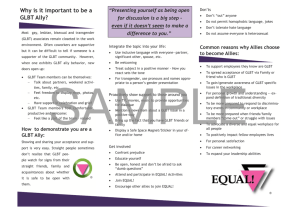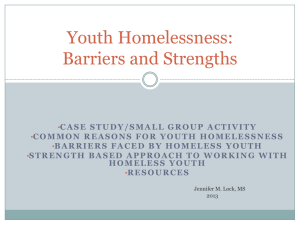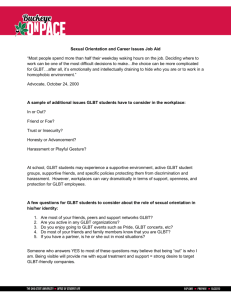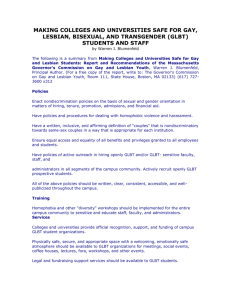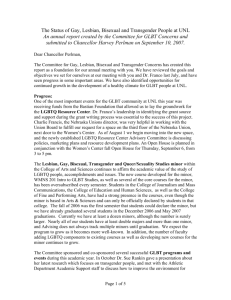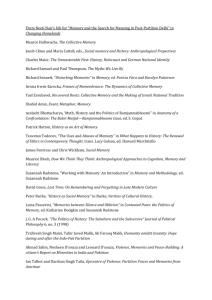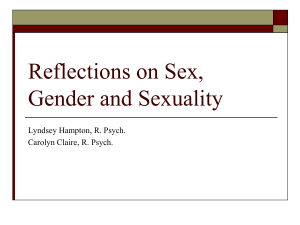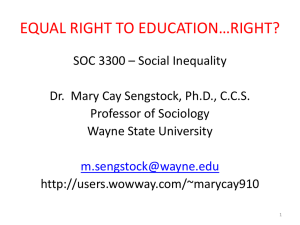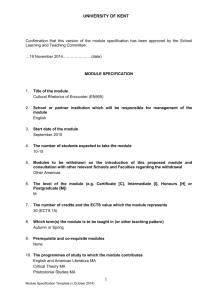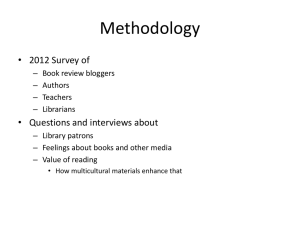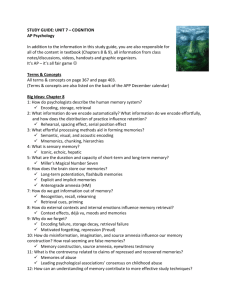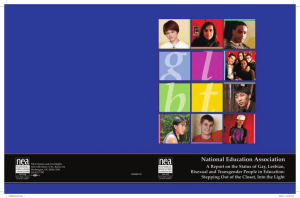DOC - Thomas R. Dunn
advertisement
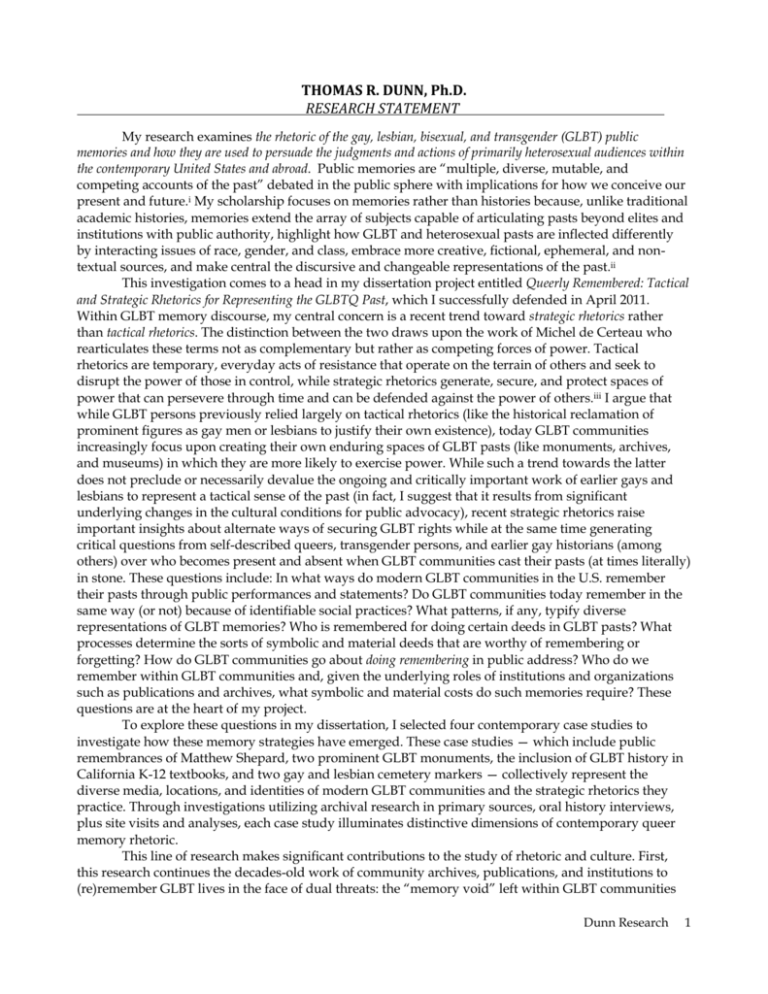
THOMAS R. DUNN, Ph.D. RESEARCH STATEMENT My research examines the rhetoric of the gay, lesbian, bisexual, and transgender (GLBT) public memories and how they are used to persuade the judgments and actions of primarily heterosexual audiences within the contemporary United States and abroad. Public memories are “multiple, diverse, mutable, and competing accounts of the past” debated in the public sphere with implications for how we conceive our present and future.i My scholarship focuses on memories rather than histories because, unlike traditional academic histories, memories extend the array of subjects capable of articulating pasts beyond elites and institutions with public authority, highlight how GLBT and heterosexual pasts are inflected differently by interacting issues of race, gender, and class, embrace more creative, fictional, ephemeral, and nontextual sources, and make central the discursive and changeable representations of the past.ii This investigation comes to a head in my dissertation project entitled Queerly Remembered: Tactical and Strategic Rhetorics for Representing the GLBTQ Past, which I successfully defended in April 2011. Within GLBT memory discourse, my central concern is a recent trend toward strategic rhetorics rather than tactical rhetorics. The distinction between the two draws upon the work of Michel de Certeau who rearticulates these terms not as complementary but rather as competing forces of power. Tactical rhetorics are temporary, everyday acts of resistance that operate on the terrain of others and seek to disrupt the power of those in control, while strategic rhetorics generate, secure, and protect spaces of power that can persevere through time and can be defended against the power of others.iii I argue that while GLBT persons previously relied largely on tactical rhetorics (like the historical reclamation of prominent figures as gay men or lesbians to justify their own existence), today GLBT communities increasingly focus upon creating their own enduring spaces of GLBT pasts (like monuments, archives, and museums) in which they are more likely to exercise power. While such a trend towards the latter does not preclude or necessarily devalue the ongoing and critically important work of earlier gays and lesbians to represent a tactical sense of the past (in fact, I suggest that it results from significant underlying changes in the cultural conditions for public advocacy), recent strategic rhetorics raise important insights about alternate ways of securing GLBT rights while at the same time generating critical questions from self-described queers, transgender persons, and earlier gay historians (among others) over who becomes present and absent when GLBT communities cast their pasts (at times literally) in stone. These questions include: In what ways do modern GLBT communities in the U.S. remember their pasts through public performances and statements? Do GLBT communities today remember in the same way (or not) because of identifiable social practices? What patterns, if any, typify diverse representations of GLBT memories? Who is remembered for doing certain deeds in GLBT pasts? What processes determine the sorts of symbolic and material deeds that are worthy of remembering or forgetting? How do GLBT communities go about doing remembering in public address? Who do we remember within GLBT communities and, given the underlying roles of institutions and organizations such as publications and archives, what symbolic and material costs do such memories require? These questions are at the heart of my project. To explore these questions in my dissertation, I selected four contemporary case studies to investigate how these memory strategies have emerged. These case studies — which include public remembrances of Matthew Shepard, two prominent GLBT monuments, the inclusion of GLBT history in California K-12 textbooks, and two gay and lesbian cemetery markers — collectively represent the diverse media, locations, and identities of modern GLBT communities and the strategic rhetorics they practice. Through investigations utilizing archival research in primary sources, oral history interviews, plus site visits and analyses, each case study illuminates distinctive dimensions of contemporary queer memory rhetoric. This line of research makes significant contributions to the study of rhetoric and culture. First, this research continues the decades-old work of community archives, publications, and institutions to (re)remember GLBT lives in the face of dual threats: the “memory void” left within GLBT communities Dunn Research 1 by the loss of millions to HIV/AIDS and the prevailing norms and presumptions of heterosexuality which have not only limited the ability of queers to be remembered without concealing their sexuality but that have willfully sought to destroy and erase such memories as immoral, unimportant, or willfully misrepresented forms of knowledge.iv Second, this research investigates public memories as one potential path toward agency that GLBT persons and similarly situated groups may find beneficial for shaping claims to inclusion, citizenship, and equality within our shared communities. At the same time, self-reflective examination of these recent practices are key to ensuring that such strategies, in a rush to secure GLBT pasts publicly, do not make those spaces of memory uninhabitable for the diverse members of these communities. Third, this project contributes to broader, interdisciplinary conversations about the histories of marginalized communities and how reflections on the past can shape the contours of not only a more equitable culture, but can complicates static and stagnant histories of the powerful and privileged as well. Finally, this project expands understandings of tactical and strategic rhetorics, in particular clarifying their relationship, how to move between them, and how strategic rhetorics might be reconceptualized for life-affirming purposes. While I plan to continue this research agenda for some time, I hope to pursue additional research interests in the near future. In particular, I would like to extend this original line of inquiry to how GLBT persons and communities figure rhetorically into the commemorations of September 11, 2001. In a separate project, I would like to draw on my experiences abroad to examine the contentious public memory struggles between local, national, and increasingly global forces within the (re)presentations of UN World Heritage Sites. I hope to present and publish in these areas in the post-dissertation phase, in addition to adding and extending case studies for my dissertation as I move it toward publication. In sum, my research focuses on the rhetorical potential of remembering the GLBT past. By doing so, I hope to better understand the effects these memories have on shifting social attitudes of the heterosexual public and how they may bring about needed reforms for more life-affirming GLBT lives. My goal is to articulate a better picture of these emerging acts of GLBT activism and memory-making, persuasive strategies that are vital for mediating the shared pasts, presents, and futures of GLBT and heterosexual persons. Kendall Phillips, “Introduction,” in Framing Public Memory (Tuscaloosa, AL: University of Alabama Press, 2004) 2. This is key for examining GLBT pasts in particular since 1) many of the more traditional forums for historical articulation, such as journals, books, archives, and museums have often been inaccessible to queers (or only accessible to those willing to hide their sexuality as i ii Dunn Research 2 an act of complicity) and 2) since most of the initial GLBT archival and recovery work was completed not by trained historians but diligent amateurs, community organizations, artists, and others intent on preserving these pasts. iii Thomas K. Nakayama and Robert L. Krizek, “Whiteness: A Strategic Rhetoric,” Quarterly Journal of Speech 81 (1995): 291-309; Michel de Certeau, The Practice of Everyday Life (Berkeley, CA: University of California Press, 1984) 35-7. iv Charles E. Morris III, “My Old Kentucky Homo: Abraham Lincoln, Larry Kramer, and the Politics of Memory,” in Queering Public Address: Sexualities in American Historical Discourse, ed. Charles E. Morris III (Columbia: University of South Carolina Press, 2007) 95. Dunn Research 3
